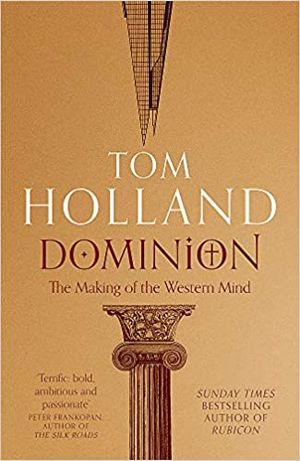I bought Dominion following its mention in Evangelical Times (‘Atheists in praise of Christianity’, August 2020). Its objective is ambitious: ‘to explain how we in the West came to be what we are, and to think in the way that we do’ (p.12). According to Tom Holland, what we in the West are is, to a surprising extent, Christian. And we are all the better for it!
The author is a historian by profession, and his method is to ‘trace the currents of Christian influence that have spread most widely, and been most enduring into the present day’ (p.12). In his hands history comes alive, because he relates developments through their impact on individuals, and those individuals’ consequent impact on the lives of others.
Holland describes himself as ‘christian’, but, significantly, not as ‘a Christian’. He applies an evolutionary mindset and explanation to historical events, and, when it comes to the Bible, a hermeneutic that frees him to treat individual texts in isolation from the whole. As far as Holland is prepared to go, people such as Abraham acquired ‘insight’, enabling them to play a major role in developing monotheism, but there is no mention of divine revelation or of saving faith.
For those reasons, I don’t think I’d go as far as the article referred to above, which described Dominion as ‘one of the most ambitious historical defences of Christianity for a long time’. That said, it contains much that a discerning ET reader will find informative, helpful, and challenging.
The contents are organised into three sections: ‘Antiquity’, ‘Christendom’, and ‘Modernitas’. In‘Antiquity’, I was immediately gripped by the way in which Calvary and crucifixion in general are set within their historical and cultural context.
‘Christendom’ starts with the Apostle Paul and shows how people who followed a crucified carpenter turned the world upside-down. Although we are unlikely to agree that all whom the author labels Christians were Christians in the sense that we understand ourselves to be Christians, many of them were, and their lives are a challenge and even a rebuke to our materialistic sloth and comparative ineffectiveness.
In ‘Modernitas’, Holland concludes that our contemporaries only have the luxury of appearing to reject Christianity because so many of Christianity’s presuppositions have become deeply embedded in our thinking and outlook. Even things held to be self-evident are not so, unless standards of behaviour first introduced and still promoted by Christians are the yardstick by which they are evaluated.
This would be an especially useful book for preachers and others who engage with the unbelieving world. Dominion contains much that could be quoted or built into our own confrontations with unbelief. The honesty with which Tom Holland approaches his task is refreshing. In addition, the accounts of Christians through the ages victoriously taking the fight to the enemy are an encouragement to the modern reader.







